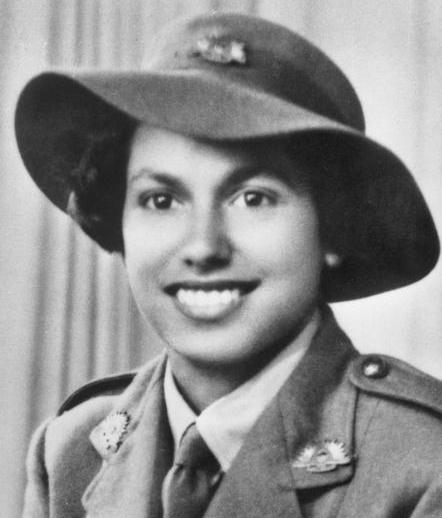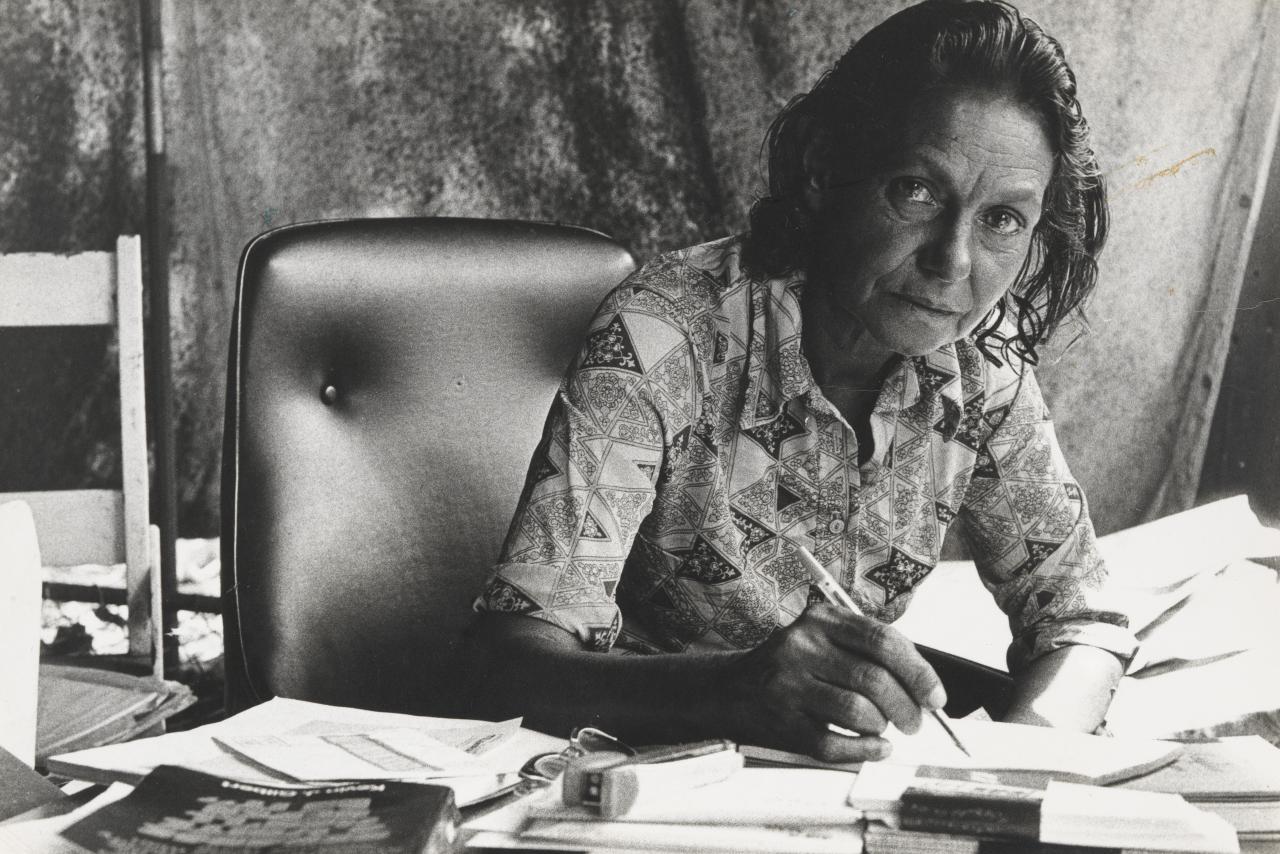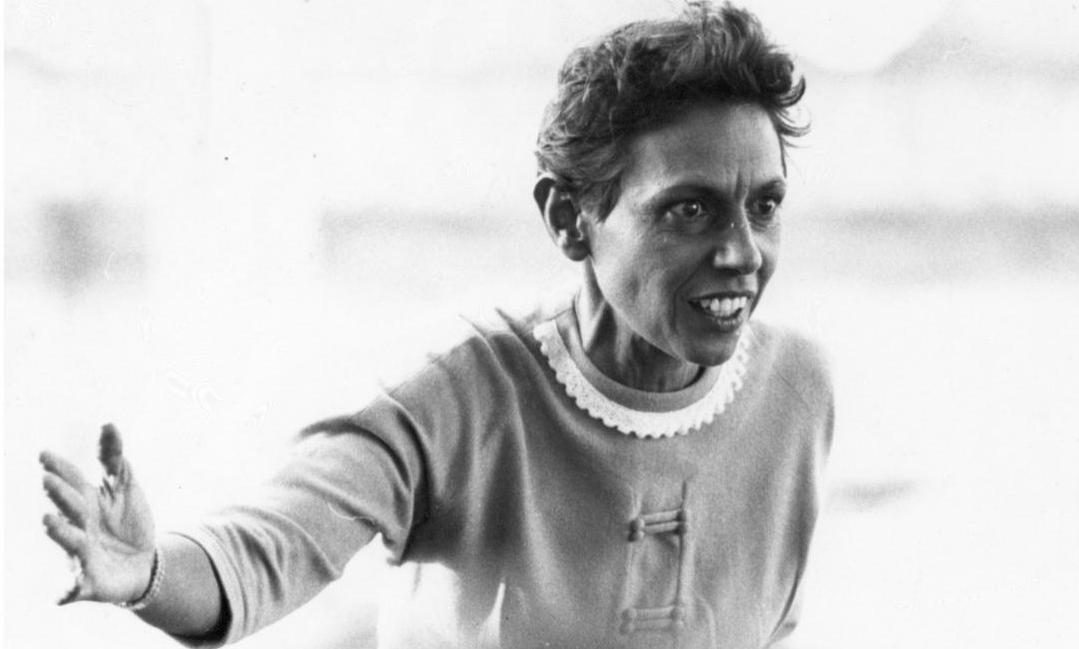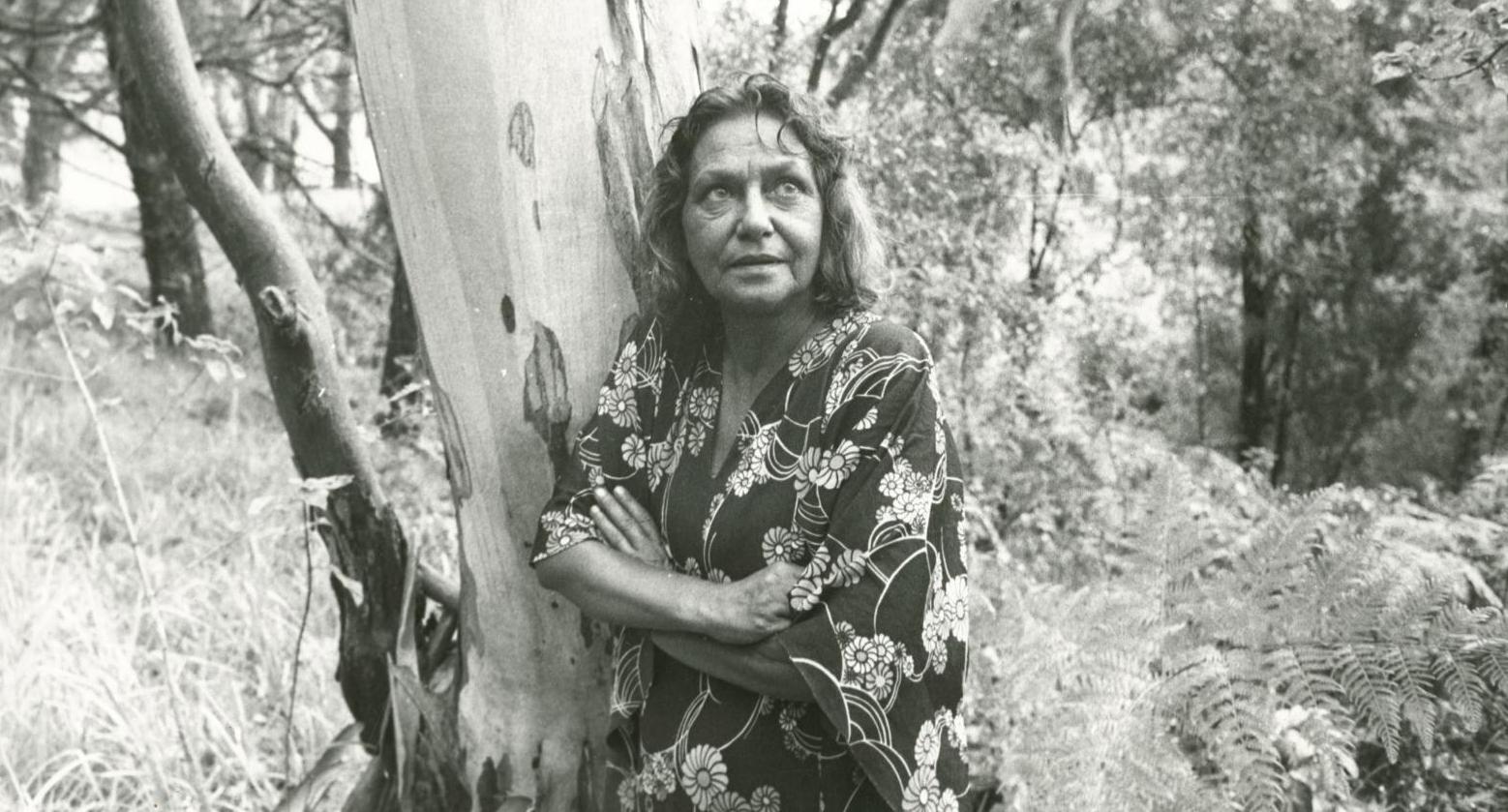Aunty Oodgeroo Noonuccal (1920 - 1993) was an Aboriginal rights activist, poet, veteran, environmentalist and educator.
*Aunty Oodgeroo Noonuccal previously known and is often referred to as Kath Walker. In 1988 she adopted the name Oodgeroo (meaning 'paperbark tree') Noonuccal.
Aunty Oodgeroo Noonuccal was born in Minjerribah (North Stradbroke Island) in Queensland in 1920. Her father, Edward, was a Quandamooka man from the Noonuccal Clan from the area around Moreton Bay and Stradbroke Island and her mother, Lucy, was of the Peewee clan from inland Australia.

"We belong here, we are of the old ways. We are the corroboree and the bora ground, We are the old sacred ceremonies, the laws of the elders" – We Are Going
Growing up, Aunty Oodgeroo had a strong connection to her sand and water Country and her culture. Her totem was Kabool the carpet snake. Aunty Oodgeroo’s father taught all his children about Aboriginal lore and values.
The Dispossessed
Image: Kath Walker, Moongalba, one 1974 Carol JERREMS. NGV.
In 1942 when Aunty Oodgeroo was 21, she enlisted in the Australian Women’s Army Service (AWAS) after her two brothers were captured by the Japanese in Singapore. She said “‘I joined the AWAS principally because I did not accept fascism as a way of life. It was also a good opportunity for an Aboriginal to further their education. In fact there were only two places where an Aboriginal could get an education, in jail or the Army and I didn’t fancy jail!”
"We could not understand Your strange cult of uniformity, This mass obedience to clocks, time-tables. Puzzled, we wondered why The importance to you, urgent and essential, Of ties and gloves, shoe-polish, uniforms." – Civilisation
Following her military service, Aunty Oodgeroo began her long career in political activism. She joined the Communist Party of Australia and gained skills in writing, public speaking and political strategy. She also began to write poetry. In 1964, she became the first published Aboriginal poet in Australia. Her poetry strongly reflected Aboriginal culture and her political beliefs. She went on to win multiple awards.
We Are Going
From the 1960s she increased in prominence as an Aboriginal leader and activist. She was elected as the Queensland State Secretary of the Federal Council for Aboriginal and Torres Strait Islander Advancement (FCAATSI) and was a member of the Queensland Aboriginal Advancement League executive. Along with other important leaders of the time, she campaigned politicians for equal citizenship rights of Aboriginal people.
Aunty Oodgeroo and FCAATSI were prominent leaders in favour of the 1967 referendum. In this referendum, Australians voted to change the Constitution to allow Aboriginal people to be included in the census (the national survey about Australia’s population). This was important because it meant Aboriginal people were officially counted in the census as people, recognising in Australian law that the racist view of Aboriginal people as “flora and fauna” was wrong. The referendum also allowed the national Australian Government to make laws that affect Aboriginal people, rather than the states. This meant Aboriginal people were no longer subject to six different systems of law depending on which state they lived in and it was hoped that new national laws would be created to promote rights and equality for Aboriginal people.
Son of Mine
Image: Kath Walker, Stradbroke Island, Queensland, ca. 1975, 2 [picture] / Bruce Howard. Trove.
While campaigning for the ‘Yes’ vote for the referendum, Aunty Oodgeroo and a FCAATSI delegation famously met with Prime Minister Robert Menzies. At the meeting, the Prime Minister offered Aunty Oodgeroo a glass of sherry. She then informed the Prime Minister and his staff that they could be arrested, because at the time it was illegal to offer Aboriginal people alcohol. It is believed that this challenged Menzies to rethink some of his views about Aboriginal people.
In 1971, Aunty Oodgeroo returned to Minjerribah where she started a learning centre named Moongalba (the sitting-down place). She taught about Aboriginal culture and Country to the visitors who came to the island. She continued to publish books and poetry and campaigned for Aboriginal rights and the environment. In 1987 she famously returned her MBE (Member of the Order of the British Empire) in protest of the bicentennial celebration of Australia Day.
"Black tribe, yellow tribe, red, white or brown, From where the sun jumps up to where it goes down, Hens and pukka-sahibs, demoiselles and squaws, All one family, so why make wars?" - All One Race
She passed away in September 1993, with many coming to farewell her at her funeral in Minjerribah. She is remembered by many as a charismatic, strong leader whose beautiful poetry captured both the strength of Aboriginal culture, while standing up for Aboriginal rights.
Sources/Further Reading
- Sue Abbey, 'Noonuccal, Oodgeroo (1920–1993)', Australian Dictionary of Biography, National Centre of Biography, Australian National University, http://adb.anu.edu.au/biography/noonuccal-oodgeroo-18057/text29634, published online 2017
- Quandamooka Yoolooburrabee Aboriginal Corporation (Quandamooka Map Source)
- Oodgeroo Noonuccal aka Kath Walker (Australian Children’s Poetry)
- Krysia Kitch celebrates Oodgeroo Noonuccal (National Portrait Gallery)
- Australian War Memorial (Kath Walker)
- "We Are Going" by Oodgeroo Noonuccal - Video Link
- Faith Bandler and Oodgeroo Noonuccal (formerly Kath Walker) on an episode of 'This is Your Life'
- Bruce Howard, Kath Walker (Oodgeroo Noonuccal), Stradbroke Island, Queensland, c.1975, nla.obj-147739369 - Image Source
- Oz At War - Oodgeroo Noonuccle
- AIATSIS - Serving their country





